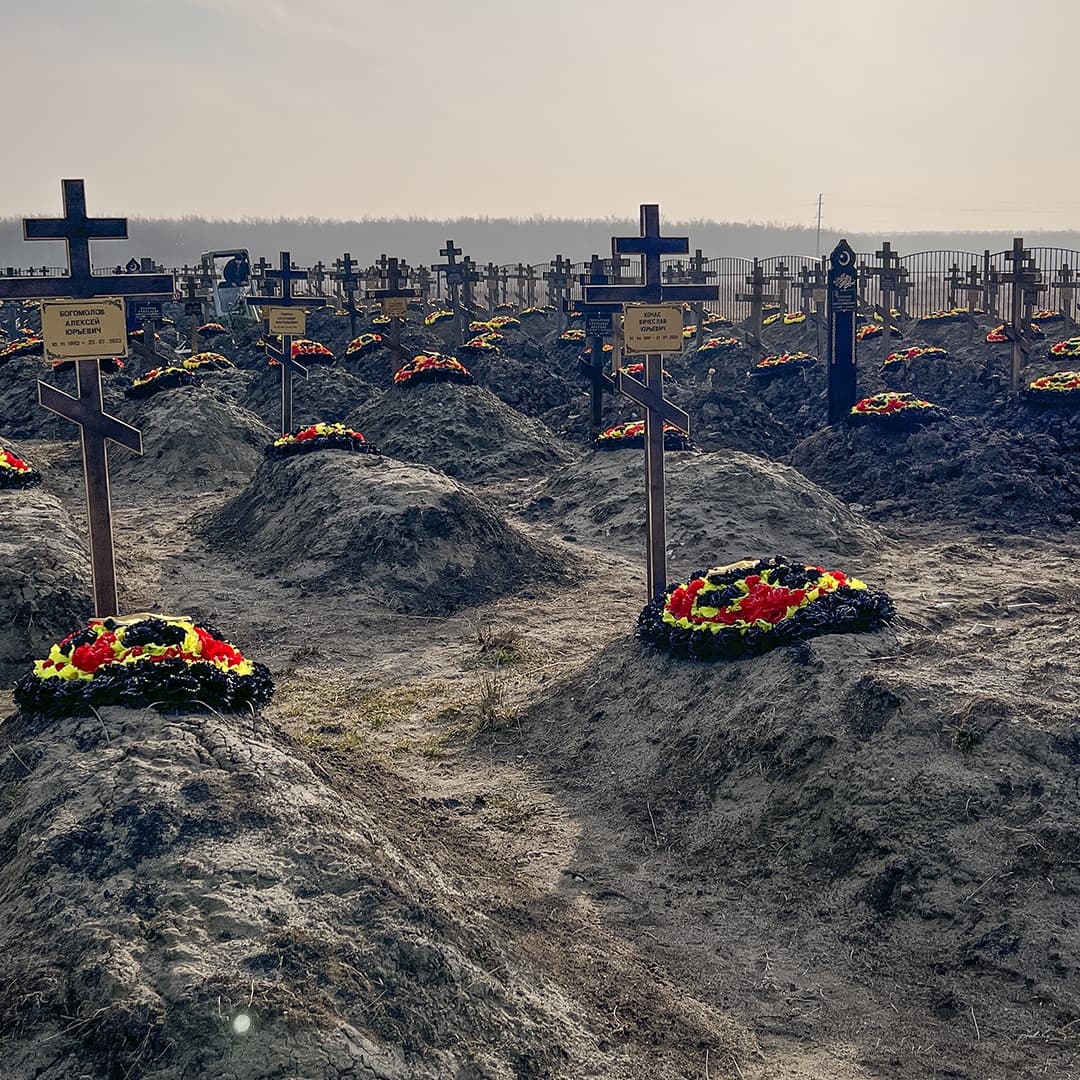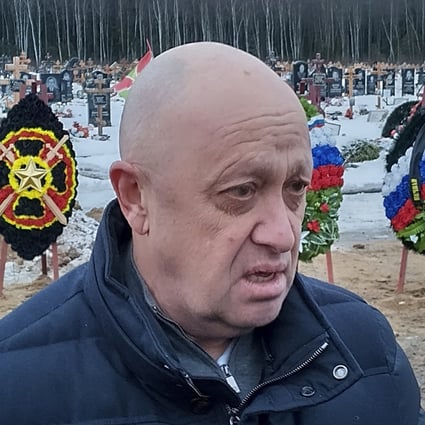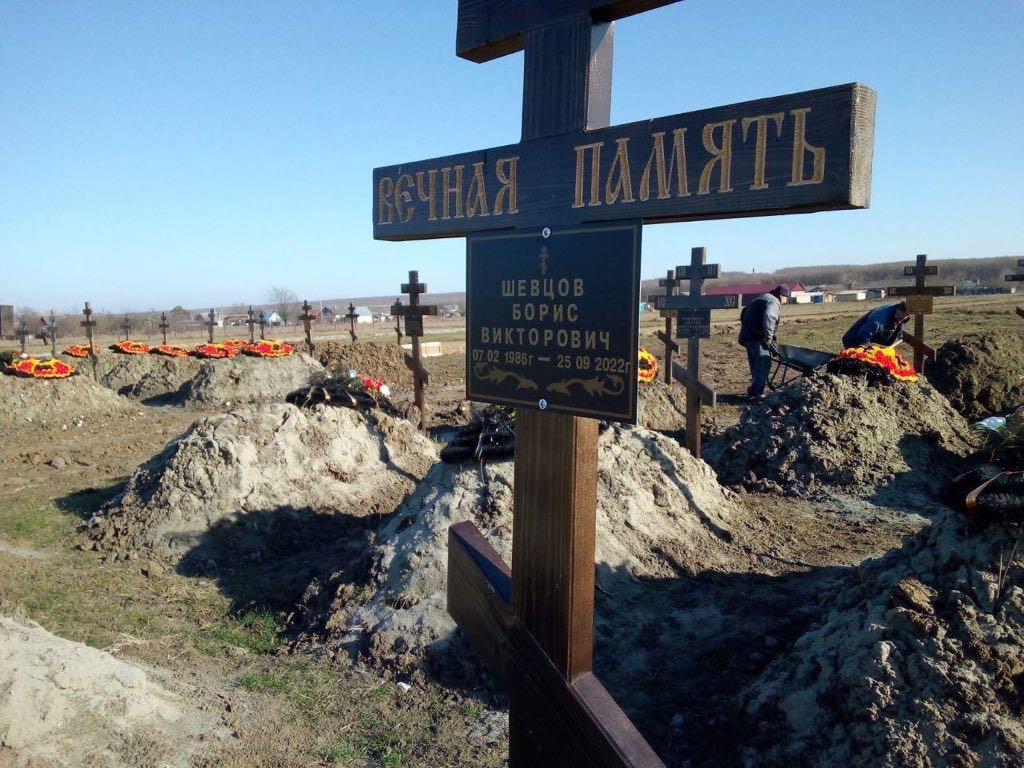Yekaterina Barkalova visited the village Bakinskaya in southwestern Russia, and saw how more than 300 fighters from the notorious Wagner mercenary company were buried in Bakinskaya since Russia's February 2022 invasion of Ukraine. In recent months, the cemetery has been expanding rapidly in size, coinciding with a bloody and costly Russian offensive in eastern Ukraine, where the mercenary group has played a key role.
 Graves at a Wagner group cemetery. Image: Twitter.
Graves at a Wagner group cemetery. Image: Twitter.
By Yekaterina Barkalova
Approximately 50,000 fighters from the mercenary company Wagner are believed to be in Ukraine, with the U.S. government estimating that the group has suffered more than 10,000 casualties while fighting alongside the regular Russian military. A growing majority of those mercenaries are inmates who were recruited to fight in exchange for being released from prison.
The Russian advocacy group Russia Behind Bars believes that as many as 40,000 prisoners have been recruited to fight for the group so far, with U.S. government estimates saying that 90 percent of Wagner's mercenaries are inmates.
During a recent trip to the cemetery in Bakinkaya, rows of freshly dug graves could be seen, as well as newly made walls meant to house cremated remains. Bakinskaya is situated in Krasnodar Krai in southwestern Russia, not far from the Russia-occupied Crimean peninsula. Many graves display combat awards along with flowers and wreaths. And while the vast majority show Orthodox crosses, others have Islamic crescent moons.
Despite the outward signs of mourning, locals say that they have not seen any organized funeral services taking place.
'They bury them day and night'
'They dig 16 holes a day in the cemetery.… They bury them day and night,' said Andrei, a Bakinskaya resident whose last name RFE/RL has withheld. 'There was nowhere to bury them [in the village or neighboring areas], so the Wagner [fighters] were given a separate cemetery.'
An RFE/RL analysis done by cross-checking the names and birth dates of the deceased with online court databases also found that an overwhelming majority of those buried in the cemetery had been convicted of violent crimes.
Located within the Krasnodar region in Russia's North Caucasus, a special chapel made for Wagner fighters is also nearby. The cemetery is not far from Molkin, a village that's home to a training facility operated by Wagner, which is led by Yevgeny Prigozhin, a Russian oligarch known as 'Putin's chef' due to the lucrative catering contracts his companies received for Kremlin events that were often attended by Russian President Vladimir Putin.
'Putin's cook' out of favor at the Kremlin?
Over the course of the past year, Wagner group boss Yevgeny Prigozhin has moved closer to the political forefront. His mercenary group has been a useful tool for president Putin for years. Wagner Group forces were active in situations where using official institutions like the army or security services was not opportune, such as in Syria. In order to strengthen his ranks for the invasion of Ukraine, Prigozhin was allowed to recruit mercenaries from Russia’s prison system. He did so, promising inmates money and, if they would survive, a return to freedom. Meanwhile, Prigozhin fell into conflict with Russian military leadership.
Over the past months, Prigozhin has tried to undermine the positions of Defense Minister Sergei Shoigu and Chief of Staff Valery Gerasimov. He did so by stressing the military's failures in Ukraine, while praising military successes his Wagner Group mercenaries achieved. Putin, however, did not remove Shoigu and Gerasimov from their respective positions; instead, he put Gerasimov in direct charge of the invasion. Last week, it was announced that the Wagner Group is no longer allowed to recruit Russian convicts into its ranks. Instead, penal battalions will be created within the framework of the regular Russian army. It seems that official army leadership now has an edge over Prigozhin, who perhaps has fallen slightly out of favor with the Kremlin.
 Wagner boss Yevgeny Prigozhin at a cemetery. Image Twitter.
Wagner boss Yevgeny Prigozhin at a cemetery. Image Twitter.
'Battalions of Death'
The cemetery was the subject of growing speculation for months, but its existence was first confirmed in December by Vitaly Votanovsky, a local activist and former Russia Air Force officer, and its growing size has been shown in various videos circulating online, as well as in satellite imagery.
Following public reports about the cemetery, Prigozhin even visited the site and has since posted videos on his Telegram channel of himself placing flowers on graves.
Russia's invasion of Ukraine has seen Prigozhin and Wagner change tack and assume an expanded public presence. Formally outside of Russia's military chain of command, Wagner was once a shadowy organization to which both Prigozhin and the Kremlin denied any connection. The group kept a low profile and operated abroad in countries like Syria, Libya, and the Central African Republic, where they gained a reputation as an effective -- and brutal -- force.
Since February 2022, the group has risen in prominence and has played an important role in Russian military success in taking Ukrainian cities like Mariupol. Wagner has also become known for adopting risky head-on infantry attacks, which Ukrainian troops have described during battles for eastern towns like Soledar and Bakhmut.
Due to these tactics, Igor Girkin, a retired Russian officer turned critic of the Russian war effort, recently described Wagner units as 'battalions of death.' Girkin, who sometimes goes by the nom de guerre Igor Strelkov, fought alongside Russian-backed forces in eastern Ukraine in 2014, where he is implicated in potential war crimesand connected to the downing of Malaysian Airlines Flight 17.
 One of the graves at the Wagner group cemetery in Bakinskaya. Image: Twitter.
One of the graves at the Wagner group cemetery in Bakinskaya. Image: Twitter.
The New Face Of Wagner
The youngest mercenary buried in the cemetery in Bakinskaya was only 18 when he was killed, while the bulk of the fighters are between the ages of 35 to 50 years old.
But while their ages vary, many of them share a similar violent criminal past that led them to join Wagner's ranks to avoid lengthy prison sentences for crimes ranging from murder to theft to rape.
Court documents from 2020 show that Sergei Marinko, a 46-year-old St. Petersburg native who is buried in the cemetery, was sentenced to five years in a prison colony for stabbing an acquaintance in the back during a drunken fight.
Another of the recently buried is Filaret Gamuryak, a 47-year-old born in Moldova who was sentenced to 10 years for murder and the attempted murder of several others. The court documents state that he stabbed a woman 10 times.
Aleksandr Korkhalev, who according to his grave markings was killed in Ukraine on January 14, was sentenced to a prison colony for 12 years for killing his mother. According to his case file, he stabbed her after she refused to give him her pension money so he could go buy cigarettes. After the stabbing, the file says that he went out drinking, returning to find his mother still conscious in a pool of blood, but refused to call an ambulance.
'Are we going to make heroes out of killers now?'
While many of these inmates with violent criminal pasts are being buried in the special cemetery in Bakinskaya, others are stirring controversy when they're returned to their hometowns after being killed in Ukraine.
One such incident recently occurred in the village Zhireken, some 300 kilometers northeast of Chita in southeast Siberia.
Nikita Kasatkin, a 23-year-old native of Zhireken who joined Wagner in hopes of commuting his sentence, was returned for burial after being killed fighting in Ukraine.
According to legal documents seen by Radio Free Europe, Kasatkin was given a 10-year sentence for the murder of a local woman in 2020 but is believed to have joined Wagner in 2022 after serving only two years.
Due to his difficult history in the small village, many residents are opposed to giving Kasatkin a proper soldier's funeral service at the local community center. However, a faction of local residents has begun lobbying Zhireken's mayor to organize a service, despite his violent past.
Locals told a correspondent from RFE/RL that the case has divided the village and revealed rifts over how to view Wagner mercenaries fighting on behalf of Russia in Ukraine, given their criminal pasts.
'The murder happened only two or three years ago, and people still remember it,' said Alena Kogodeyeva, Zhireken's mayor. 'Many residents are outraged, and there are those who say, ‘Are we going to make heroes out of killers now?'
Similar episodes have happened across Russia in recent months. In one case from January, Prigozhin himself took to his social media channels after the parents of a Wagner fighter who was serving a sentence for theft was killed in Ukraine and denied a funeral in his hometown of Kamyshlov when his body was returned.
'Unfortunately, I was not aware that the [mayor's office] decided to show its [savagery] in this way,' Prigozhin said in a statement posted to the Vkontakte page of his company Concord. 'We will deal with this scum and we will try to pull their children by the nostrils to participate in [Ukraine].'
This article was first published by Radio Free Europe/Radio Liberty's Siberian outlet.
